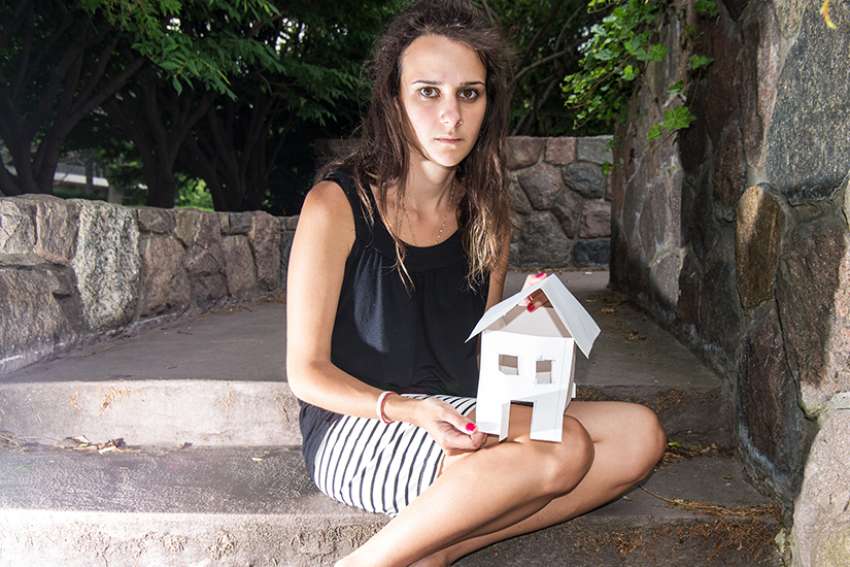Beginning Jan. 1, 2018, up to 3,000 women who have survived violence and abuse or endured life in the sex trade will be eligible for provincial rent subsidies.
Photo Illustration by Michael Swan
Family Services seeks long-term housing solutions
By Michael Swan, The Catholic Register
The money helps, but Ontario’s new initiatives to help victims of domestic abuse and human trafficking still face some hurdles, warns Catholic Family Services of Toronto.
Beginning Jan. 1, up to 3,000 women who have survived violence and abuse or endured life in the sex trade will be eligible for provincial rent subsidies. The “portable housing benefit” is good for any apartment in the private rental market.
For women who have left abusive relationships and found a place in a shelter, rent subsidies are good news, said Catholic Family Services of Toronto program manager Shereen McFarlane.
The back-up in shelters is “horrendous,” said McFarlane. “Talking to the shelter managers that I sit with, where they initially had people in for a short period of time, they’re now there longer, not having a place to go.”
The expanded rent subsidies were unveiled in a three-year, $30-million program by the Ontario government. It comes on the heels of Ottawa’s 10-year, $40-billion National Housing Strategy announcement on Nov. 22.
Beginning in 2020 the provincial program will grow to $15 million per year, said the Nov. 28 announcement from the Ontario Ministry of Housing.
Although welcomed, the new provincial subsidies face two practical hurdles, said McFarlane. First, it’s a small subsidy in a very expensive rental market with a low vacancy rate. At the pilot project stage, the monthly subsidies ranged from $245 to $665 per month. Second, when the subsidy runs out women will find themselves in suddenly unaffordable apartments.
Getting out of a shelter and into stable housing is a priority for women dealing with the trauma of domestic violence, McFarlane said.
“If they don’t have a home, they won’t see the priority of sitting and talking with someone about their emotional state,” she said.
While CFS-Toronto has a housing officer on staff to help women search for apartments, it doesn’t own or operate housing.
For clients who simply need a lifeline in an emergency to help them re-establish a normal life, a rent subsidy pilot project launched in 2016 has worked well, according to McFarlane. But for women who face multiple issues — physical and mental health issues, education and training deficits, language barriers — getting stable takes longer.
“We don’t know what happens to those women when the pilot (program subsidy) is done,” said McFarlane.
At Covenant House, which runs one of the province’s most comprehensive programs for survivors of sex trafficking, the additional funding was welcome news.
“This is something we advocated for,” said Covenant House spokesperson Tracie Leblanc. “It will help us house youth more quickly and keep them housed.”
Affordable housing remains the biggest challenge for aid agencies. While nationally the rental vacancy rate stood at 3.0 per cent as of October, down from 3.7 per cent a year earlier, the situation in Ontario is more acute. The provincial vacancy rate has shrunk to 1.6 per cent and in the Greater Toronto Area it stands at 1.1 per cent, with average rents of $1,296 per month, according to the Canada Mortgage and Housing Corporation.
Province-wide, the average rent for bachelor apartments is $897, while in Toronto bachelor units go for an average of $1,011. Provincially, rents have increased 3.8 per cent over the last year, while in Toronto rents are up an average of 4.5 per cent.
A combination of higher immigration, tighter mortgage qualification rules, an improving job market encouraging young people to move out of their parents’ homes and more seniors hitting the rental market is stretching an already thin supply, according to CMHC senior market analyst Gustavo Durango.
On Nov. 29 the Ontario Ministry of Housing announced it will rebate up to $125 million in development charges over five years in an effort to encourage investment in new rental buildings.
Please support The Catholic Register
Unlike many media companies, The Catholic Register has never charged readers for access to the news and information on our website. We want to keep our award-winning journalism as widely available as possible. But we need your help.
For more than 125 years, The Register has been a trusted source of faith-based journalism. By making even a small donation you help ensure our future as an important voice in the Catholic Church. If you support the mission of Catholic journalism, please donate today. Thank you.
DONATE

